Start your day right
Sign up for Essential California for news, features and recommendations from the L.A. Times and beyond in your inbox six days a week.
You may occasionally receive promotional content from the Los Angeles Times.
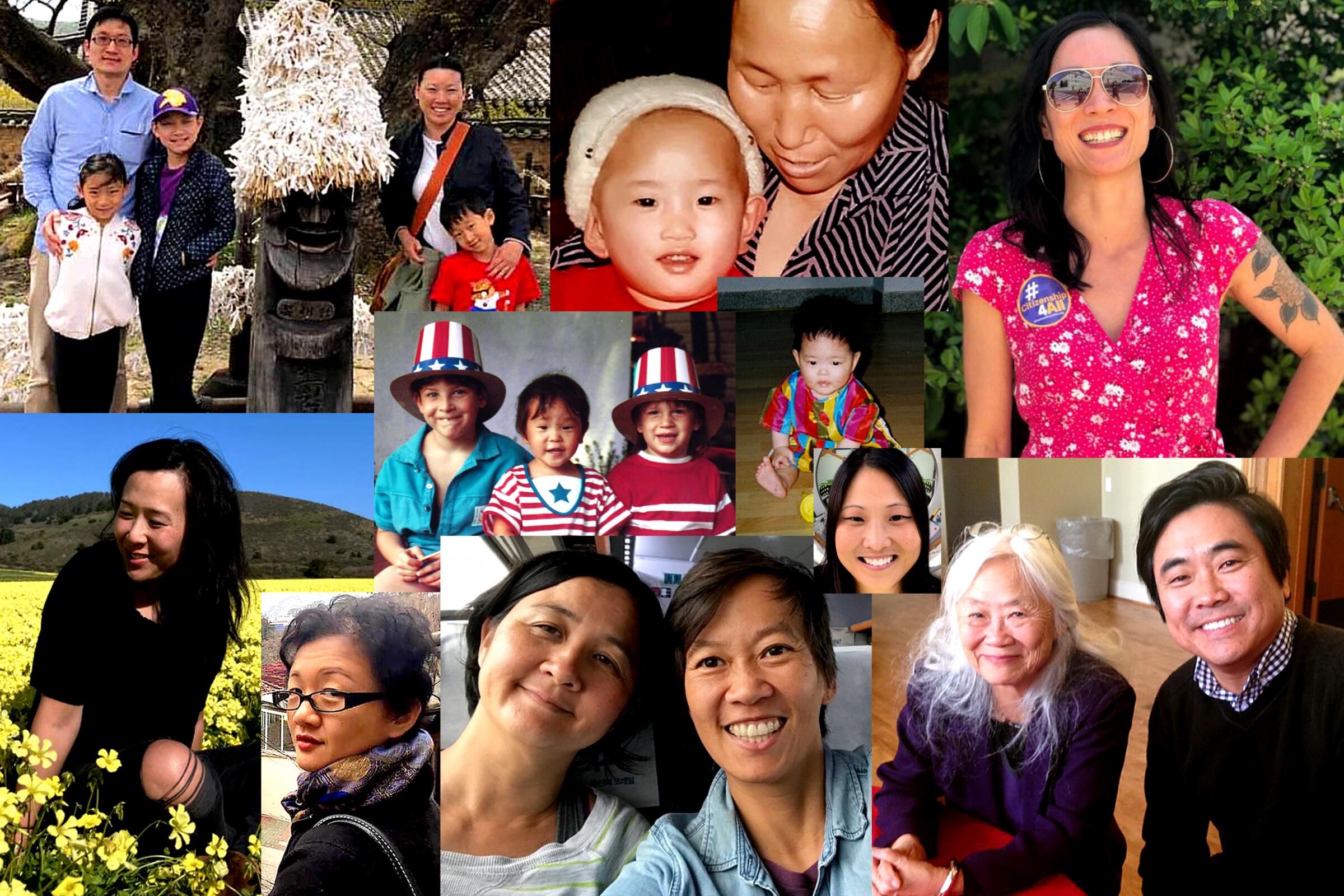
After the mass murder of spa employees in Atlanta last month and amid a surge in anti-Asian hate across the country, Americans of Asian descent banded together in protest and grief.
Among them were some of the estimated 200,000 Americans adopted from China, South Korea and other Asian countries. Raised in many cases by white parents in largely white communities, they have a unique perspective on race and racism in America, and one that is all too often overlooked.
“In light of the horrific events in Georgia and around the country during this pandemic, these people have been wondering where they fit in,” said Iris Chin Ponte, a professor at Lesley University and a specialist in early education, who has been leading adoptee support groups for more than 20 years.
Kim McKee, a professor at Grand Valley State University in Michigan, an author of a book about Korean adoption and a Korean adoptee herself, said this community is “trying to figure out what does this mean in terms of building coalition with other Asian Americans, what happens when my parents don’t recognize that I’m a person of color.”
As the white father of an adopted Korean daughter, I know some of the issues that surround international and transracial adoption. As a newspaper reporter, I’m in a position to provide them with a bit of a public voice.
I talked to more than a dozen adoptees from South Korea and other Asian countries. (One of them, Tina Zhu Xi Caruso, is a family friend who suggested this story.) They described a number of shared experiences: growing up in nearly all-white schools and communities; parents who had no experience or understanding of racism; a sense of loss for their biological families and ethnic culture; and a desire to express their outrage over anti-Asian hate from their own unique perspective.
Here are their words.
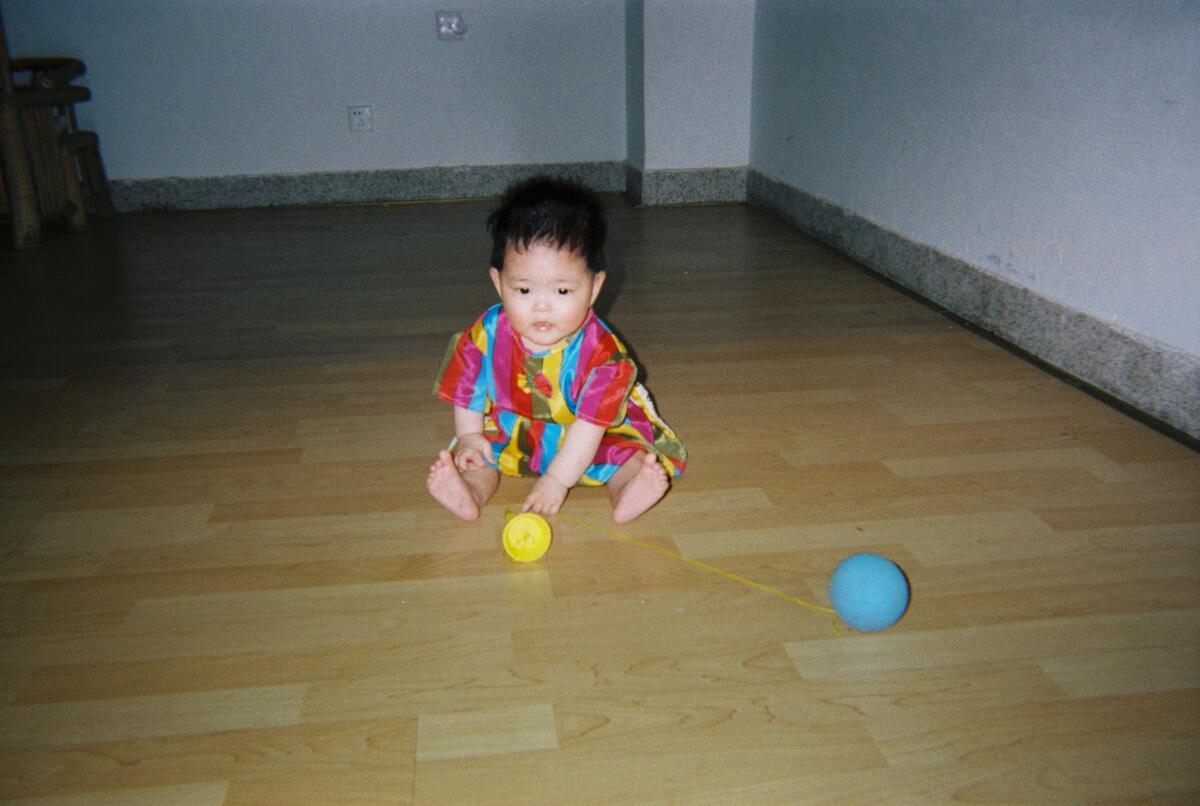
Tina Zhu Xi Caruso, 22, attended Stop Asian Hate rallies in her hometown of Boston two days after the Atlanta killings. Asian people from all walks of life spoke, along with speakers from Black Lives Matter. “But I noticed there were no adoptees speaking up. I realized Asian adoptees do have a say.” So she took a turn at the microphone, too.
Questions of identity make it difficult for adoptees to move into this particular spotlight, she said.
“You feel like you don’t belong in the Asian community, but you don’t belong in the white community your parents raised you in either,” Caruso said.
Caruso was adopted from China and is now a student at the Massachusetts College of Art and Design. Her activism has been empowering, Caruso said, but it has also brought up feelings of grief and loss of heritage. “People [at the rallies] were saying, ‘I came out for my parents, I came out for my grandparents.’ It made me kind of sad. I want to know who my birth parents are.”
She was raised by two white parents. Her mother, she said, made sure to connect her with Chinese culture through videos, books and support groups with other adopted kids.
But even the most sensitive non-Asian parents can’t fully understand the aggressions and micro-aggressions that Asians, both children and adults, often suffer.
“They may say it’s not important, or may just be uncomfortable talking about racism,” Caruso said. As a first step, she advised validating a child’s thoughts and feelings — for instance, by acknowledging how hurtful mean comments can be.
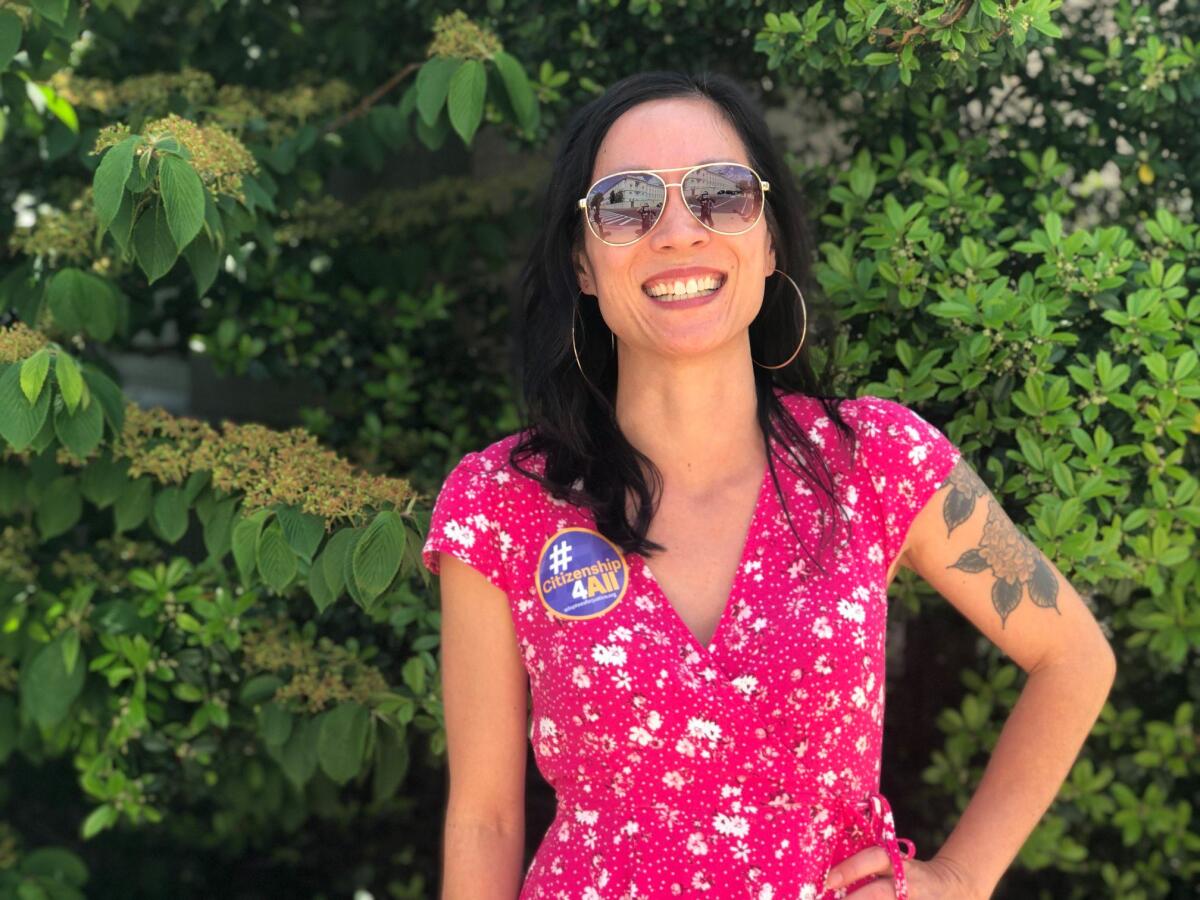
Mila C.C. Konomos, 45, lives in Atlanta, seven miles from two of the spas where workers were killed, with her husband and two children, ages 7 and 10.
When she heard the news, “I wasn’t surprised per se, but I was terrified.”
Adopted from South Korea as an infant into a white military family, she said she’s dealt with anti-Asian racism — intentional, or based in ignorance — her entire life. Being adopted into a white culture complicates the Asian-hate issue for her.
“I got to experience all the racism of being Asian but none of the connection to food and language and family,” she said. “My only connection to my Asian heritage is stereotypes.”
She’s been called Twinkie and banana. “Your English is so good,” she’s told, though English is her native language. “It’s been with me since kindergarten, people pulling up their eyes, going ‘ching-chong.’”
Growing up, home offered no respite. “My whole family made fun of my looks,” she said. “I do love my family, but it’s very complicated.” When she was bullied for being Asian, by her three white brothers or others, her parents said she was too sensitive. “It can really be hurtful because the people that are supposed to be your family and love you the most have no idea what your daily life is like.”
Adoptive parents, she said, shouldn’t beat themselves up for errors of the past. “It’s OK, it’s part of the journey,” she said. They should remember, though, that making amends is “not going to ease the pain and trauma.”
A few years ago, she searched for her birth parents in Korea. She’s in touch with her father. She doesn’t speak much Korean, and he doesn’t speak much English.
“We use a lot of emojis,” she said.
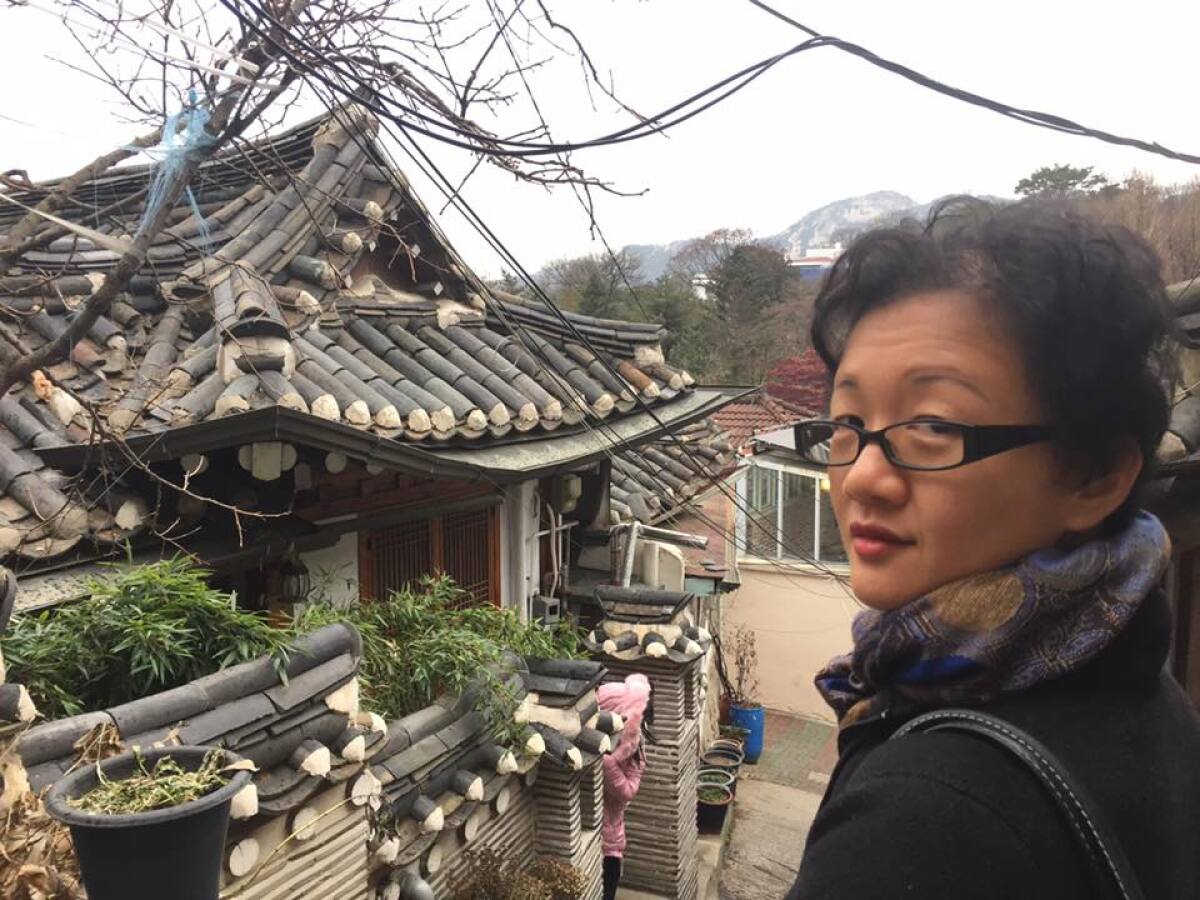
Julie Macartney, 44, lives in Atlanta. “For me,” she said, the spa killings “were just another violent and tragic reminder of my whole eternal otherness in this country.”
Adopted from South Korea, Macartney grew up in McHenry, Ill., northwest of Chicago. Most of the time, people treated her as white, she said, albeit with some appalling exceptions. (Signing her junior high yearbook, a classmate addressed her with a slur.)
Her family’s blue-collar background synced, she said, with some of the values held by immigrant Asian culture in the U.S. at the time: “Work hard, keep your head down.”
She’s happy to see that culture starting to shift — the part about sucking up abuse without protest.
She’s appreciative of her adoptive family, too. “I’ve never experienced anything other than love from my family,” she said.
A few days after the shootings, she talked to her mother by phone. “She didn’t have the right words, but she said please be careful when you go out walking with the dogs. That was her way of telling me she saw me, she saw the news.”
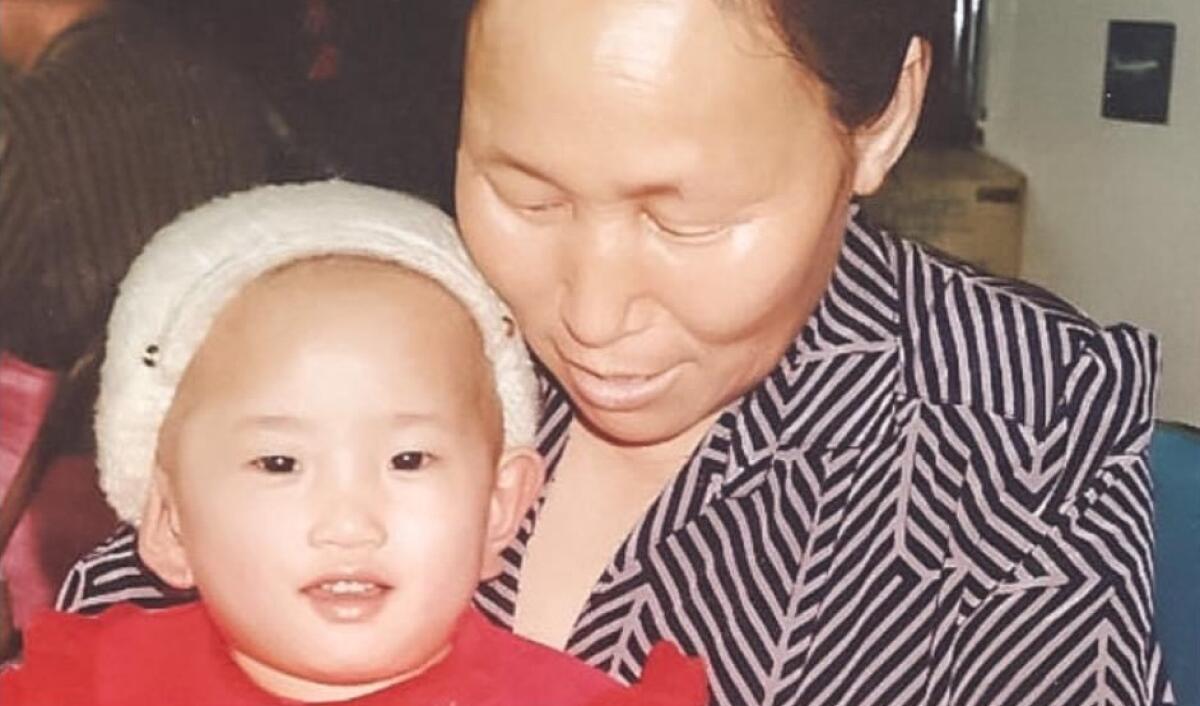
Christina Romo, 38, was adopted from South Korea by a white family and grew up in Minnesota, where she still lives. She runs a blog called Diary of a Not-So-Angry Asian Adoptee, which has developed its own community. She’s well aware of the fear and emotional turmoil that the Atlanta killings created.
“Being an Asian adoptee adds a lot of different layers to this,” she said. “A number of Asian adoptees have experienced the erasure of our cultures and racial identities.”
Many Asian adoptees “were raised in situations where our parents didn’t necessarily know how to support our racial and cultural needs, and don’t know how to talk to their adoptees about race and racism,” she said.
White parents “were essentially told that love would be enough.”
Hate crimes against Asians and Asian Americans jumped dramatically in major U.S. cities in 2020.
That’s changing, she said, but not fast enough. “There are parents who still believe that being ‘color-blind’ is OK and that Asian adoptees are somehow immune to racism.”
Some white parents have asked her for advice in recent weeks, given the rise in hate speech and violence and the Atlanta slayings.
“They are feeling a lot of guilt and belief that they have failed their children” on dealing with issues of race, bullying and discrimination, she said. “I tell them that you can’t change the past. What’s important now is listening to adoptees, believing them, affirming their truths, and learning how to support their racial and cultural needs. The adoptees’ voice has been so overlooked in adoption.” Her own parents, she said, have been “pretty supportive.”
For some Asian adoptees, she said, the killings seem like a double loss. “We don’t have knowledge about our first families. We were left wondering if one of [the Atlanta victims] could have been our mother.”
One of the Atlanta victims’ first name was the same as her given Korean name, Soon. “It’s the first time I had encountered anyone with the same Korean first name,” she said. “It means kindness.”
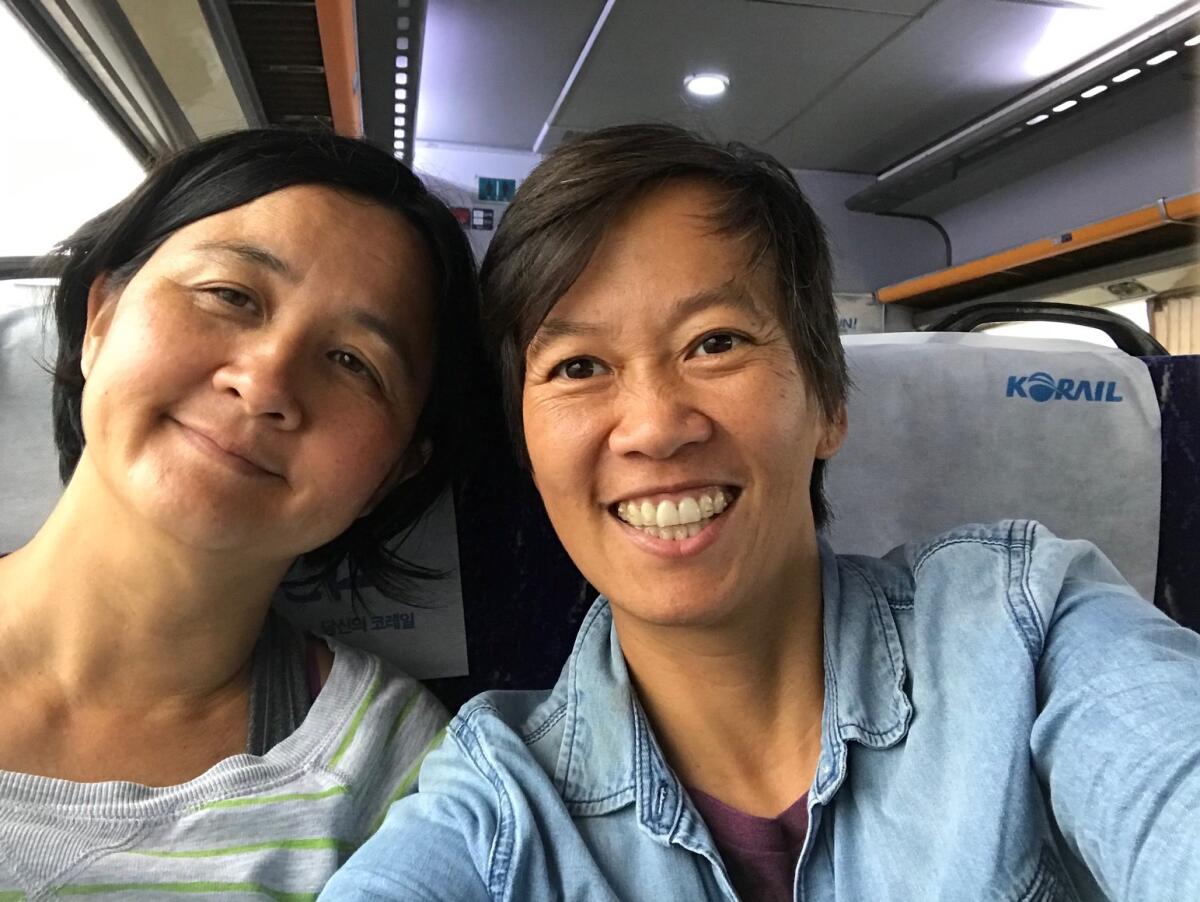
Amber Field, 46, has advice for white parents of Asian adoptees: “Your child is going to experience racism.”
Field, who identifies as nonbinary, experienced it growing up in southern Illinois as one of only three Asian Americans in a high school class of 350.
Adopted from Korea, Field didn’t get much support from their white mother when bullied at school. “If I told her about things that were happening to me, she’d say, ‘Oh, ignore it, stop your whining, everyone gets teased, no one likes a victim.’ There’s a way that she can’t really hold racism.”
For many white people, whiteness is a norm to which other races should conform or aspire to, and don’t much think about what it means to be white. “If you’re a white person, just based on the color of your skin, you’re going to have your own experience and not face racism,” Field said.
For transracial adoptees going through an especially hard time right now, Field suggests seeking out community connections. They’re active in the Asian American and Pacific Islanders community and at the East Bay Meditation Center, a mindfulness group that actively promotes diversity.
“Being isolated, not having support is the worst,” Field said.
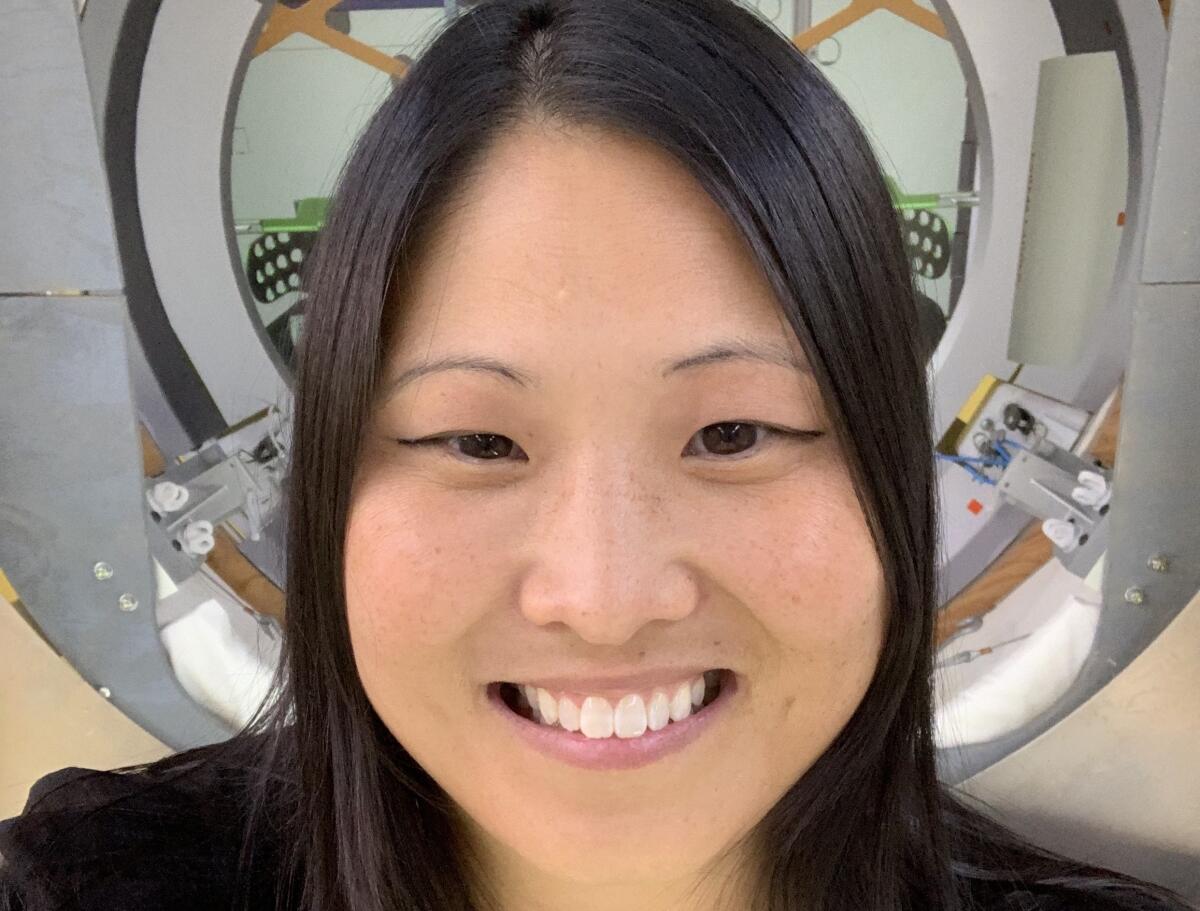
Megan Soliah, 41, grew up in Jacksonville, Fla., where she felt like an outsider. Her white adoptive mother tells a story about pushing Soliah in a stroller when a white man approached, pointed to the baby, and said, “Is her daddy like that?”
Adopted from Korea, she grew up feeling out of place most of the time, and fearful when kids made fun of her. “They made the ‘Chinese eyes,’ told me to go back to where you came from,” she said.
Now living in Los Angeles, a vice president at a product placement agency, she finds that “the majority of the people who are surprised [by anti-Asian hate] are living in large populated cities and haven’t experienced racism outside the bubble.”
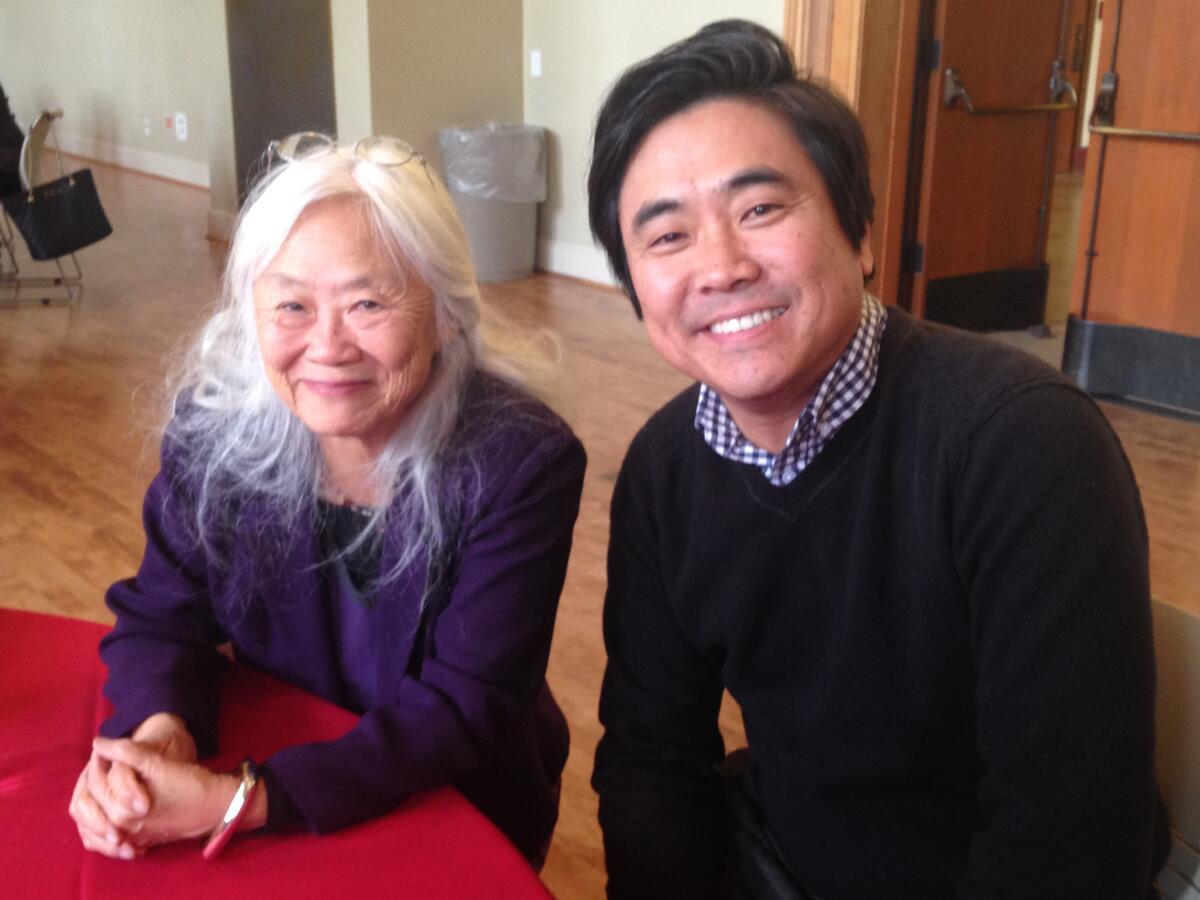
Lee Herrick, 50, began to discover his Korean identity in college after a childhood in the Northern California town of Danville, where he was the only student of color at his elementary school.
“Others might have access points through music, through films,” he said. “For me, it was through literature.” Herrick is now a professor at Fresno City College and a poet. His latest book is titled “Scar and Flower.”
Because most Asian adoptees grow up in white culture, “they begin to believe that they are almost if not totally white,” he said. “That’s a danger for everybody involved. There are some who deny their identities well into their 50s.”
When white people hear white racism being called out, he suggests they reduce their defensiveness and not justify, deny or minimize the racism. “They’re not necessarily calling you, as a white person, a racist,” he said. “They’re calling it what it is: racism. Get on board with that and become part of the progress instead of the problem.”
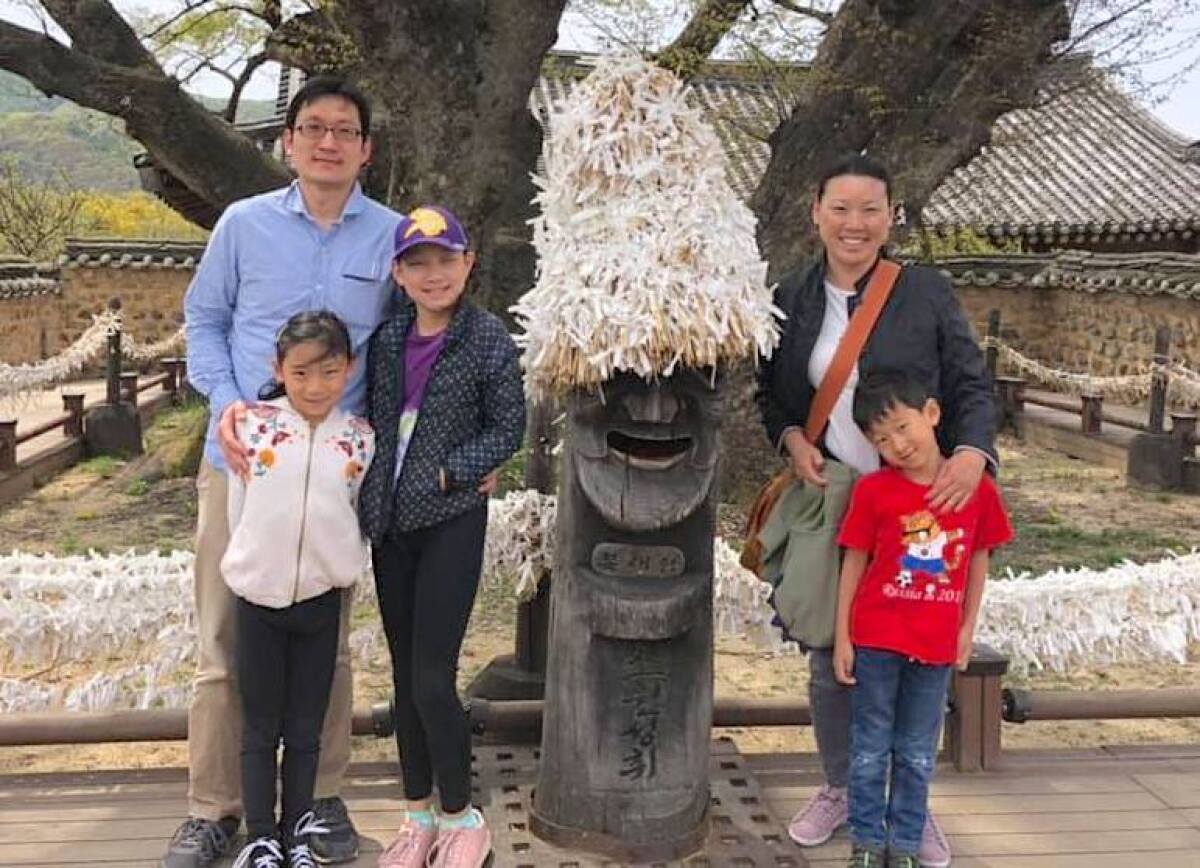
Nellie Sung, 43, was adopted from Korea at 8 months old and grew up in St. Paul, Minn.
Her white parents never talked about race. “They didn’t ever,” she said. “Ever. Never.”
Her parents “were so white upper-middle class I really don’t think they ever had a friend who wasn’t white,” she said. “I had an older sister, their bio child. She was the golden child. I was the yellow sheep.”
She suffered the taunts of schoolmates, for being Asian and for being adopted. One asked whether her vagina went sideways. One told her: “I bet your parents wish they could return you.”
Sung connected with her Korean heritage when she went off to college and looked to live in a place more diverse than where she grew up. She settled in New York City, where she is development director at Korean American Story, a nonprofit organization that interviews Korean immigrants and shares the stories though its website.
While New York City is plenty diverse, Asians Asian Americans are still being attacked there. “I never felt so fearful for my kids as I do now,” she said.
Contemporary parents of Asian adoptees may be more open to discuss racism with their children than earlier generations, but still struggle, she said. Younger adoptees have told her their families reached out to them after the Atlanta murders killings, “but in a sort of ‘I don’t know what to say’ way.”
“My parents and adoptees of my generation were told to assimilate us and love us as their own with a very ‘color-blind’ approach, which itself can be damaging,” she said. “There needs to be a broader conversation about race that includes their role as parents to a nonwhite child and their role as a white person in society.”
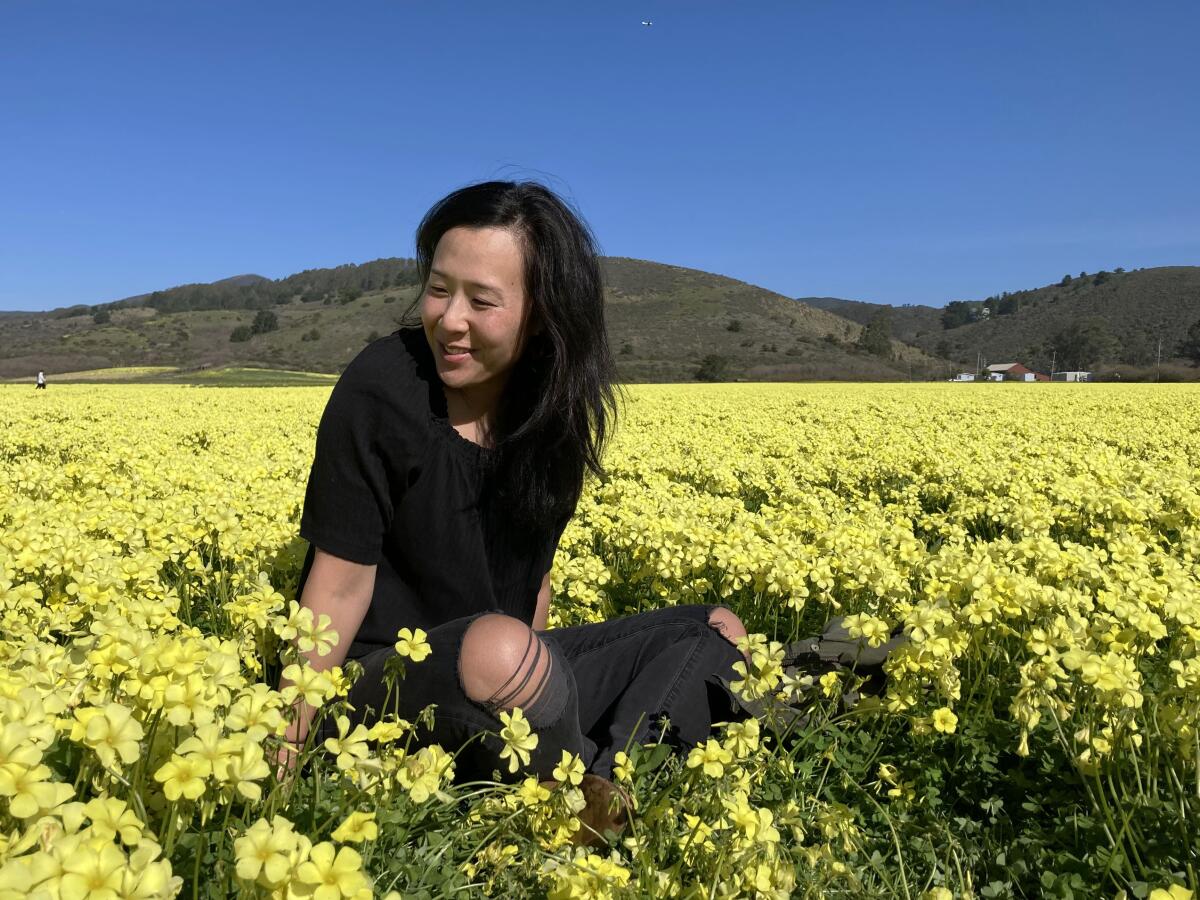
Leah Nichols, 35, was adopted from Korea. She believes the system of transracial adoption is corrupt and should be ended.
“I can love my transracial adoptive family and wish to abolish the adoption system that created it,” she said.
“White Americans knowingly removed children from their homes and brought them to a place of deep existing racism in the name of saving them.”
She acknowledges her proposal to end transracial international adoptions is radical. But, she notes, such adoptions are on the decline.
International adoptions from countries including China, Korea, Russia, Guatemala and Ethiopia have ceased or been dramatically reduced. In February, the Dutch government put a moratorium on international adoptions after it found evidence of child trafficking and other abuses. (Adoption advocates opposed what they deemed an overly harsh measure.)
In the United States, 12,732 children were adopted from other countries in 2009. In 2019, that number was 2,971.
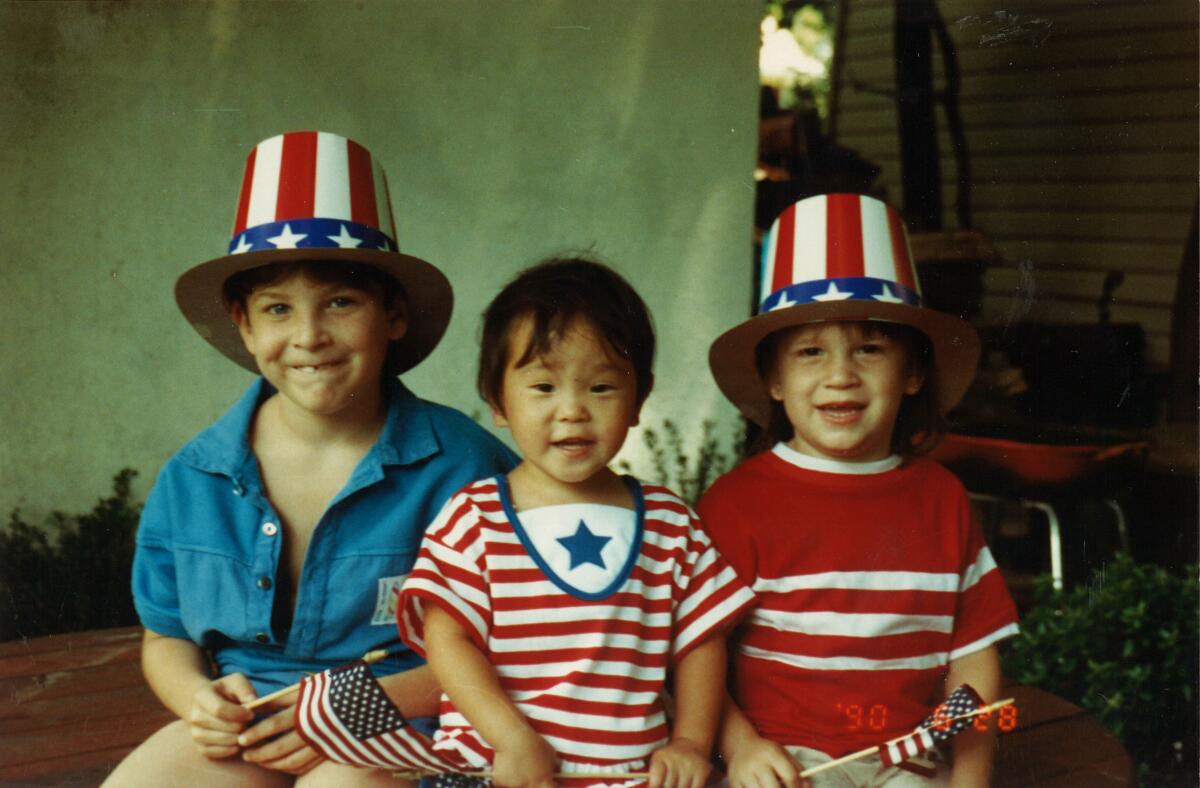
Los Angeles actress Sam Futerman, 33, is well known in the adoption community for producing and co-directing the 2015 movie “Twinsters.” The award-winning documentary follows Futerman, a Korean adoptee, as she locates and reunites with her twin sister Anaïs, who had been adopted by a family in France.
Each grew up with white parents in white cultures, so dealing with and talking about issues surrounding transnational and transracial adoption is nothing new to her.
But, she said, “The rise in anti-Asian crimes and especially the Georgia shootings brought up anxieties I didn’t even know I had.”
After the Atlanta killings, “I felt anger and sadness, and a tinge of guilt.” But, as a beneficiary of white privilege, she also thought, “I’m not allowed to feel those things.”
The Asian American community uniting to protect its elders inspires her but brings up issues she is sure many other Asian adoptees are grappling with: “My elders don’t look like the people who are the victims,” she said. “They look like the people creating the hate crimes.”
Growing up in a white family and a white culture with Asian features can leave transracial adoptees feeling “that we’re never enough,” she said. Especially with racial hate on the rise, adoptees may feel lost.
“It’s no fault to our parents. They’re showing us copious amounts of love,” she said. “But they don’t necessarily know how to handle the situation at hand, and that’s why we’re feeling alone.”
Start your day right
Sign up for Essential California for news, features and recommendations from the L.A. Times and beyond in your inbox six days a week.
You may occasionally receive promotional content from the Los Angeles Times.